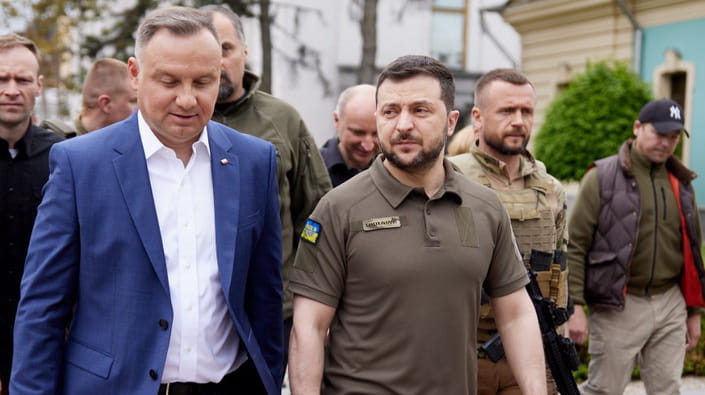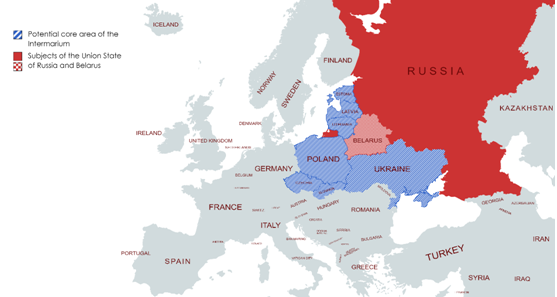Revival of Intermarium: Forgotten Polish Idea to Help Ukraine Get Closer to Europe

The consequences of the second Russian aggression in Ukraine will change the world in many aspects from international law to nuclear safety, but also locally from regional cooperation to integration. Although Ukraine has now successfully applied to become a member of the European Union and by each passing day confirms it’s NATO membership worthy, it is perhaps more relevant today to focus on the pre-membership period. In this period, key decisions and events will take place, which will take Ukraine closer to being fully integrated to the European and Western family.
Nevertheless, it is not an easy road; various reforms are a pre-requisite of becoming a full member. Estonia's experience is no exception – the process of integration and reforms can be measured in a decade – as both were finalized only in 2004. Regardless of how Ukraine rebuilds itself, with the help of the new Marshall Plan 2.0 or eventually the Russian capital seized in Western banks for reparations, an enormous task remains ahead after the war has ended and the territorial integrity of Ukrainian has been restored.
It is important to emphasize this because this is a specific process, which needs support on all levels of the society. Ukraine needs assistance in going through these systemic processes, so gaining membership could be as smooth and efficient as possible. For that, we could give another try to an idea of the former geopolitical concept of Intermarium.
The Intermarium (Latin for Between-Seas) was a Polish post-World War I geopolitical concept that envisaged an alliance of countries reaching from the Baltic Sea over the Black Sea to the Aegean Sea that would serve as a third power bloc between Germany and Russia.
Like the French cordon sanitaire against Germany from the interwar years, it was a product of its time, an extraordinary solution to an extraordinary problem that is centuries old. A federation as a counterweight to both Russian and German imperialism. Since the concept never materialized due to many issues of which the most prominent was the fact that no East European country wanted to find itself under Polish leadership, little attention from scholars has been paid to its early history, with few exceptions.
Over the last decade, the idea has gained once more attention, most notably among Western strategic circles.
The Intermarium idea actually belongs to the long genealogy of geopolitical concepts looking for and promoting a Central and Eastern European unity. The original concept foresaw a federation of independent states, centered dominantly on Poland, to oppose both the German and Russian imperialism. It has since been regularly revived in evolving contexts and finds itself reactivated today.
Although Intermarium was destined to fail at the time of its inception for purely pragmatic reasons, the idea has remained an integral part of the Polish geopolitics. Furthermore, its weaknesses were economic inefficiency and non-institutionalized framework, which was not able to assure any significant achievements in military and defence cooperation.
Following the second Russian invasion of Ukraine, unlike in 2014, there are signs that the former Polish centered concept could become a reality, albeit on different terms and on different grounds. Yet, it would be still driven by the need to provide a countervailing force against an imperialism, this time exclusively from the East that is determinedly seeking revenge for the so-called greatest geopolitical catastrophe of the century and demands to return to the 1997 NATO borders. These goals alone pose existential threat to democracies and cultures of East Europe.
If Intermarium were to formed, it would require at least the free will to form a functional federated organization with defensive capabilities, a weakened Russia and approval of the West – conditions that never co-existed in the twentieth century, unlike now.
Paradoxically, it is not the Russian imperialism that threatens the emergence of such a transnational, broadly inclusive, values-based alliance, but a possible reliance on a single leader, which would be best suited (again) for Poland. That would repeat the mistakes of the past because the desire for integration must be common to all, based on the principle of equal treatment – there should not be difference between a small and big countries, as the joint core values and goals are universal to them – to maintain democracy, freedom and security.

Fig 1. Visualization of the proposed value-based Intermarium, which could accelerate Ukraine’s Euro-Atlantic integration and mitigate the challenges it may entail.
Despite Ukraine gaining most benefit from such possible scenario today, the eastward threat is shared throughout the region.
Even though there is no guarantee how Intermarium would actually work out or who the exact members would be, something can still be noted. It would be greatly different compared to the post-World War I proposal, limited in my opinion mainly to the Baltic States, Poland, Slovakia, Czech Republic and Ukraine (see Fig 1), yet with a greater chance of succeeding. Namely, there are strong historical reasons, which the Russian foreign policy continue to uphold in East Europe that also keep the Intermarium proposal relevant.
Complementing as a whole both the future (larger) European Union and NATO through stronger regional ties and alliances.
At the same time there is also a possibility that any Intermarium related grouping, could function only a limited time being a jump board towards to full integration, where sharing the experiences (as well as the pains) of accession between nations that understand the regional dialect of the geopolitical language unambiguously, would help to speed up and smooth the process.
As Estonia's experience shows, this can be followed by an era where strong alliances of the past are replaced by more thematic debates and negotiations depending on the needs of the politics of the day – countries vote on decisions within EU institutions often by blocs depending on the issue and their national positions. They have done so in the past and probably will continue to do so in the future. In this case, it would be already up to Ukraine to choose with whom to side on one issue or another.
The Ukrainian desire and request to be accepted and become part of the greater and real European security (NATO) and economic (EU) framework which was identical for Estonia, is still in the interest of all before mentioned parties. Let us put it bluntly, without the achievement of these strategic objectives, Ukraine would remain a perpetual periphery of Europe, with its attendant threats and constraints.
On a European scale, it would be a true geopolitical catastrophe of the 21st century – to be so close and yet so far away, in the corner of the European waiting room.
Hannes Nagel,
Head of the Crisis Research Center (Estonia)
